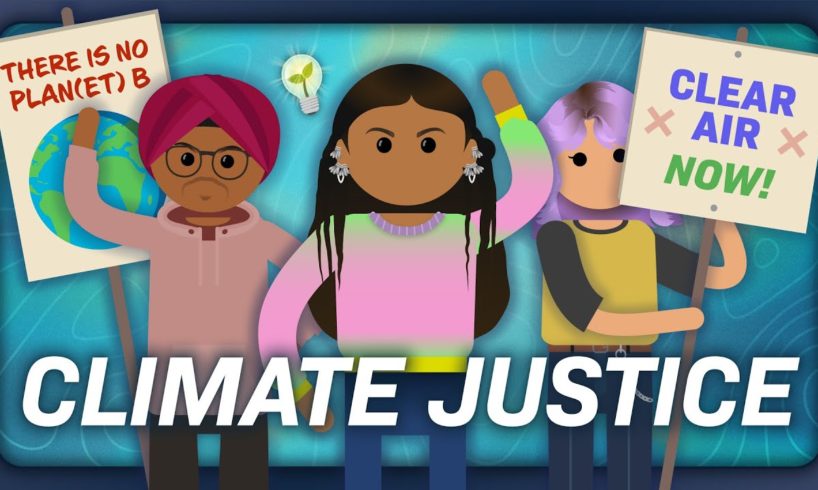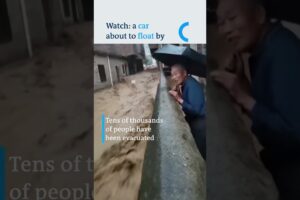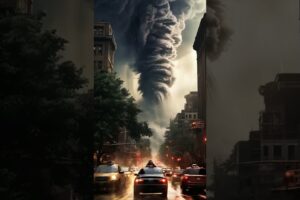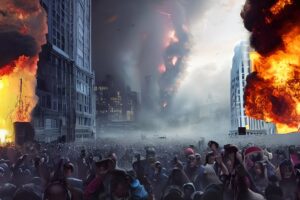
Climate change has no bias, but our societies and systems do. And although it’s a danger to all of us, a changing climate affects some groups disproportionately, raising issues of justice and equity. In this episode of Crash Course Climate and Energy, we’ll take a look at the ways injustice within societal structures causes climate change to affect some more than others and discuss some of the work that environmental justice advocates are doing in response.
Chapters:
Introduction: The Rohingya & Climate Inequality 00:00
How Climate Affects Our Lives 1:45
Climate Justice 3:22
Redlining & Climate Inequality 7:18
Social Inequality & The Climate 9:43
Renewable Energy & Inequality 12:15
Review & Credits 13:21
Transcript: https://docs.google.com/document/d/1t6NawMFtcuxcF_ln9Ruqyf8ELUrFhcBqHLUdizNRfgI/edit?usp=sharing
Sources:
https://docs.google.com/document/d/1rRJ-L9TLNfPwPfzn3LdjDEw-wHtThwTfDUe2rDtFXQQ/edit?usp=sharing
Watch our videos and review your learning with the Crash Course App!
Download here for Apple Devices: https://apple.co/3d4eyZo
Download here for Android Devices: https://bit.ly/2SrDulJ
Crash Course is on Patreon! You can support us directly by signing up at http://www.patreon.com/crashcourse
Thanks to the following patrons for their generous monthly contributions that help keep Crash Course free for everyone forever:
Katie, Tori Thomas, DL Singfield, Amelia Ryczek, Ken Davidian, Stephen Akuffo, Toni Miles, Steve Segreto, Kyle & Katherine Callahan, Laurel Stevens, Burt Humburg, Allyson Martin, Aziz Y, Perry Joyce, Scott Harrison, Mark & Susan Billian, Alan Bridgeman, Rachel Creager, Breanna Bosso, Matt Curls, Jennifer Killen, Jon Allen, Sarah & Nathan Catchings, team dorsey, Trevin Beattie, Eric Koslow, Jennifer Dineen, Indija-ka Siriwardena, Jason Rostoker, Siobhán, Ken Penttinen, Nathan Taylor, Les Aker, William McGraw, ClareG, Rizwan Kassim, Constance Urist, Alex Hackman, kelsey warren, Katie Dean, Stephen McCandless, Thomas Greinert, Wai Jack Sin, Ian Dundore, Justin, Mark, Caleb Weeks
__
Want to find Crash Course elsewhere on the internet?
Facebook – http://www.facebook.com/YouTubeCrashCourse
Twitter – http://www.twitter.com/TheCrashCourse
Instagram – https://www.instagram.com/thecrashcourse/
CC Kids: http://www.youtube.com/crashcoursekids
source







Thank you for enriching us
Can you make one on the history of Saudi Arabia 🇸🇦
Regardless of what is actually happening; the result never changes.
Human is doomed to the natural decay of entropy. No amount of pragmatism or efficiency will ever change that.
Humans will last only as long as nature allows us to. That's it.
Martha's Vinyard never suffers, despite being on the ocean front.
*Like this comment if you like Natural Disaster facts and other unknown facts. *
Brilliant
The narrative that the Rohingya are muslim minorities being discriminated against by a Bhudhist majority is completely wrong. I have spent a good amount of time in Myanmar, mostly interracting with locals and traveliing to places most tourists don't. While Bhudhism is the most prominent religion in Myanmar, I think it's most notable feature is that it is the most religious country I have ever been to. Almost every town has not only has a Bhudhist temple, but also a Mosque, Christian church and Hindu temple. The predjudice towards the Rohingya people has absolutely nothing to do with them being Muslim. It is a complicated situation that western media sources never represents properly, because the idea that they are being victimized because they are a Muslim minoriy sells. In the future, please try to get more global sources and local perspectives when doing your research.
Climate change is a crises of justice what an interesting and even scary sentence🤔🤔🤔
CrashCourse❤❤❤
Thank you, Dr. Jackson. If anyone could provide a comprehensive overview of climate injustice in under 15 minutes, I knew that you could. Can't wait to share this with students in the Climate Change module of my Environmental Health course at OSU #GoBeavs!
Some disasters are natural, like hurricanes and rain storms, but most of them are caused by us, through global warming.
Adequately addressing the climate crisis will be hard enough, but doing it in a just and fair way would be significantly more difficult. It would require a new economic and political paradigm. Under the existing paradigms, inequality is not only tolerated, it's the point.
No comments about Mac and Cheese?
🙏🙏🙏🙏🙏👍👍👍👍❤❤❤❤❤❤❤❤❤
Another educational and thought provoking video from crash course. One of my favorite channels on YouTube
Man made climate control!!!
such a powerful video
I'm really loving this series. You guys always make quality content that's both informative and easy to digest. If you ever chose to do a Course on Game Theory you'd make my life so much better. But either way thank you for all your hard work ❤❤❤
As Bill Patzert, a climatologist at NASA once said, natural disasters and climate change are all normal phenomenons but what is not normal is the extent to how often they occur and the speed at which they happen.
That was punchy! Speech 💯, great work 👍👍 I wasn't sure but I'm learning stuff!
Capitalism baby
Thanks for this very important topic/part of the climate crisis. 👍
In other words, it’s business as usual. The haves take advantage of the have Nots. Such it has been since humanity climbed down out of the trees, and so it shall be forever more. We are nearly as involved as we think we are…😢
How does planned obsolescence affect climate?
Does planned obsolescence mean unnecessary manufacturing which produces more CO2 and cause more junk to be shipped around because junk has to be replaced?
Where do economists talk about the depreciation of durable consumer goods?
Any climate energy policy that ignores nuclear power is idiotic. Yes we should try to increase renewable energy use, but nuclear power is more reliable and has a lower carbon footprint than solar. It's also incredibly safe.
Circular economy or BUST
Could the "free thinking critics" please comment below why they believe this information is false or irrelevant. I am curious.
The term "natural disaster" is such a poor phrae. Should be HAZARDS /events. The disaster component is how we measure impact primarily on humans and infrastructure.
Thank you for summarising this complex issue to well & succinctly! Natural extremes are natural, but healthy ecosystems are usually quite resilient to most of them and recover quite quickly. Human civilisation has unfortunately altered most ecosystems, making them less able to withstand extreme natural events (which are also being amplified) and less resilient to shocks, e.g. draining wetlands & harvesting peatlands, removing mangrove & kelp forests, damaging coral reefs, developing coastlines (altering coastal processes), deforestation etc.
We must also bear in mind that as human populations become more urbanised (around 70% by 2050, although many countries have much higher urbanisation rates than that) , more people are affected when such disasters hit cities (of all sizes). Many natural disasters (amplified by ecological changes) are also exacerbated by poor, ineffective or maladapted city planning, development & management, as well as aging infrastructure no longer able to withstand increasingly severe weather events. This on top of historic class, gender, racial & other community discrimination.
Several new urban planning & development strategies & technologies have been developed to make cities more climate friendly involving the implementation of green & blue infrastructure. Such strategies include
– low-impact urban design & development (liuddd)
– water-sensitive urban design (wsud) and sustainable urban drainage systems (suds)
– sponge cities
City governments, decision-makers & managers, social leaders businesses, civil society and residents must work together to make cities more compact, integrated, inclusive, sustainable, green, safe, gender-sensitive, child-friendly AND climate ready. During design charettes, city manages & community residents come together to discuss & plan community design road by road, block by block. Projects are usually implemented on a temporary basis to ascertain effectiveness & iron-out any unexpected hiccups that might crop up. If all goes well and most residents support the changes, then the project is made permanent (aka tactical urbanism). Many projects need a city-wide plan (e.g. managing water & integrating green spaces, mobility infrastructure, utilities etc) and there are budgetary constraints. Communities also assist implement projects such as planting trees, restoring damaged ecosystems, improving community services (eg. free libraries, community gardens) and creating and / or improving public spaces.
The challenges are many, but so are the solutions. Where there's a will, there's a way…
The menu bill metaphor reminds me of an episode of Friends when Rachel, Phoebe, Joey have to pay a lot more even though they ordered so little…
Thanks M and the CrashCourse team for the episode. Climate change is indeed a real problem for many in the world around us. Nigeria got some severe flooding last year in their rain season. The Caribbean continues to be blasted by hurricanes and fallout from adverse weather events due to climate change. And we are not large-scale greenhouse gas emitters. Yet when we are affected by these events, we get minimal aid from those larger nations and are forced to borrow in order to recover and rebuild, further indebting our small island economies and stifling overall national development. We need to do better as a global village. People are losing their lives because of the status quo. Just because it doesn't affect you directly doesn't mean it's not affecting others. Two people died in Dominica last year due to flash flooding, costing millions in damages. Severe weather events in our region since 2010 have cost us billions in damages, taken a major toll on human life and wellbeing, including the mental health of those affected. We need to change our global order to make it equitable, just and make it work for all nations.
If only China & India could stop being the biggest polluters in the world.
is that amity blight in the thumbnail
Thanks for the nuanced take on this
Correction @ 5:55
Wealthy, economically-developed countries have emitted the majority of anthropogenic CO2 in the atmosphere. I'm not aware of a reasonable estimate that puts the total anthropogenic CO2 above 50% of the current atmospheric CO2 (though we're darn close).